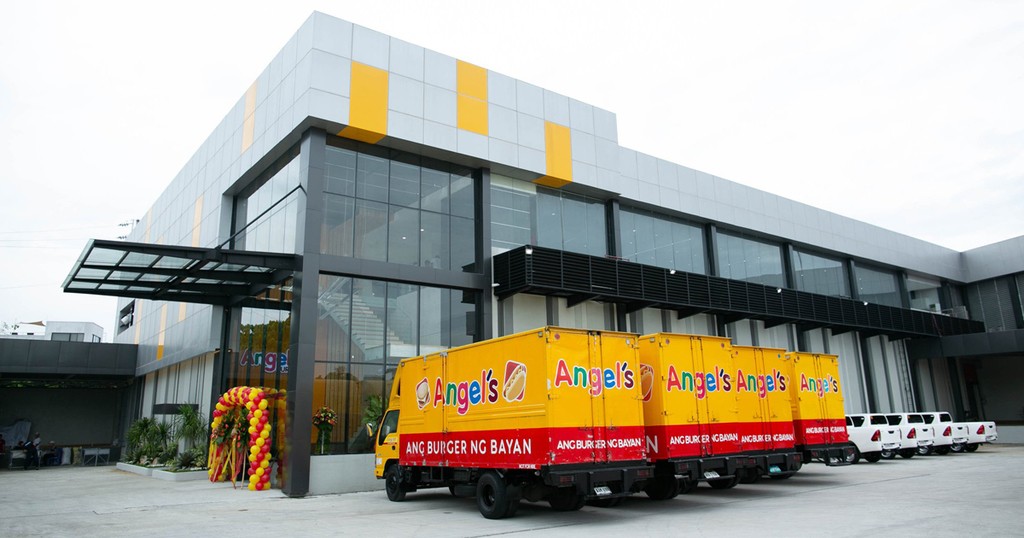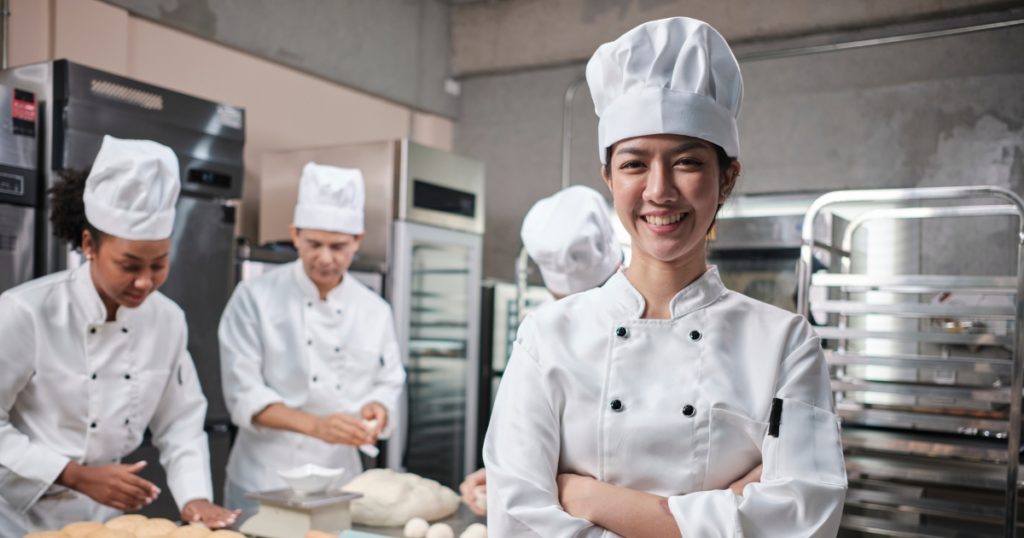If you’re considering a sideline to supplement your finances, a food business in the Philippines is ideal. After all, everyone needs to eat!
Even the most unlikely food businesses can become profitable. Have you seen Angel’s Burger’s commissary in Marikina? Who knew that a buy-one-take-one burger business model could fund a big building like that?

Of course, profitability is not limited to just selling burgers. You can look at other examples of a food business, such as bakeries or stores that exclusively sell ice cream, fruit shakes, shawarma, or french fries. We bet you can name various brands that are successfully selling those and are making good money!
But if you’re still on the fence about starting a food business, read our five reasons to create one. You might find yourself convinced at the end of the article-especially since The Bailiwick Academy can make things easier for you to start!
*Note: This was originally published on August 12, 2021. This was updated today, August 19, 2023.
Reason 1: Food businesses are always wanted.
The pandemic that occurred in 2020 caused many businesses to close down or reduce operations because they were declared as “non-essential.” However, many food businesses, such as sushi bake and ube pandesal sellers that became the “in” food, also popped up. These, the Philippine government classified as essential and important.
See? Having a food business in the Philippines during a pandemic means your income-earning capacity is pandemic-proof (although, hopefully, this never happens again)!
Also, your food business can be about anything, and people here would buy. Check out Facebook Marketplace alone, and you’ll see what we mean. People sell coffee beans, pizza, shawarma, milk tea, etc.
In other words, all food business ideas you can think of are valid because Filipinos love to eat! And now that the pandemic is over, Filipinos can roam and gather freely again. That makes for a great opportunity for you to put up your food business now!

Reason 2: You don’t need to be a chef to run a food business.
Unlike specific jobs, you don’t need to pass a civil service exam to have a food business. You don’t even have to be a professional chef, although that will help.
But think about it: not all chefs are also business people. Some would not want the headache of running a food business all while cooking at the same time. What’s important is that you have an idea and a target market that will buy from you.
Of course, make sure to legitimize your operations by registering your business, even if it’s a small one. That’s the best way to start a food business in the Philippines – make it official.
Think about it: eventually, you might find yourself wanting to expand. You won’t be able to without the required paperwork, so make sure to fulfill the necessary requirements and save yourself a lot of headaches in the future.

Reason 3: You can run a food business from anywhere.
Check out various food businesses in the Philippines. They are situated in bus terminals, near schools, or are food carts in malls. You won’t see the business owners or any franchisee of Jollibee running the store-they hire other people to do that.
The same goes for a catering business and other food businesses. If you plan to have a business outside your home, you need other people. Don’t think of it as additional overhead costs; instead, think of it as a way to multiply yourself.
Just make sure you train them according to your specifications and wants. Then you can relax at home and spend even more time with the family, all while earning passive income. Just make sure to quality-check your employees occasionally to ensure that they’re running your business smoothly.

Reason 4: You have many options.
What’s the best food to sell in the Philippines? Well, we can’t really answer that. As we mentioned in reason 1, Filipinos LOVE food.
So any of your business ideas would probably have a market. We recommend enrolling in The Bailiwick Academy for food recipes for business in the Philippines. Studying in our classes might give you ideas of menu items you’d like to sell; classes include making dimsum, doughnuts, and even taho!
But you don’t have to if you can’t think of any original food ideas. There are plenty of food business brands in the Philippines offering franchises. You can check out the aforementioned Angel’s Burger, Mang Inasal, or Red Ribbon as examples.
Again, we can’t say which food franchise is the best in the Philippines. Instead, we suggest checking the franchise fees to see if you can afford them and how they treat their franchisees. Also, implement a good marketing strategy for your food business in the Philippines to ensure you’ll make a profit.

Reason 5: Getting the word out about your food business in the Philippines is easy.
Word of mouth is essential when it comes to any business. If you treat a customer well, they’ll be so happy they’ll talk about you to their friends. That would bring more attention to your business, hopefully, more sales for you. And we know Filipinos love to tell stories, whether online or in person.
But you know something else? Filipinos love using social media. According to Statista, as of 2019, there were around 74 million Filipino Facebook users.
That means if even only one person posts about your food business, plenty of people will get to see it! And using social media is free. In fact, social media is one of the tools you should use for your online business.
If you are not using it now, you’ll be missing out on many customers who might be looking for your product. And that’s only for organic reach.
What if you started using paid Facebook ads to get the word out about your business? You can drive even more traffic to your business with the correct targeting and budget, get more sales, and immediately earn back what you spent on ads.

Want help starting your food business in the Philippines?
If you’re still unsure about starting a food business, why not start a food trailer business? It takes a smaller capital than starting a restaurant, it can help you earn more than a home-based business, and you get a mixture of mobility and flexibility.
Plus, you can experience the following benefits:
- Customization: From your trailer’s design to the menu, you have the freedom to define every aspect of your brand.
- Flexibility: Found a hot spot in town? Move there! Rainy day? Take a break. A food trailer gives you the liberty to operate on your terms.
- Fewer Staff Requirements: No need to manage a big team. Often, it’s just you, the cook, and maybe an assistant. It simplifies operations and reduces overheads.
If you’re thinking, “This is intriguing, but where do I start?”, you’re in luck! The Bailiwick Academy is opening up a new master class called Food Trailer Fundamentals!
Whether you’re an OFW seeking a profitable venture or a home baker wanting to level up and share your goodies with the world, the Food Trailer Fundamentals master class is your guide to success on wheels. Dive deep into the intricacies of this business, learn about potential pitfalls, and discover best practices from industry veterans.
It’s not open yet, but click here to join our waitlist and be the first to know when you can enroll!
Final Thoughts
Has this list convinced you? If yes, we can’t wait to see what food business you’ll start, whether home-based or a food cart franchise. Just remember, like anything worth doing, running a food business in the Philippines will take plenty of work.
But if you work hard and keep at it, you’ll definitely achieve success!
Again, if you’re looking for food ideas to start your food business, you can find plenty of ideas here at The Bailiwick Academy! Sign up now and start browsing through our courses!
—
Keep coming back to The Bailiwick Academy blog for more kitchen tips, tricks, and much more!


Pingback: Burnt Basque Cheesecake - The Bailiwick Academy
Pingback: Yummy Tarts: Six Flavors That You Should Definitely Try!
Pingback: Donburi Dishes You Should Absolutely Taste! - The Bailiwick Academy
Pingback: Common Middle Eastern Foods! - The Bailiwick Academy
Pingback: What's a Croquembouche? - The Bailiwick Academy
Pingback: It's Thai-me to Talk About Thai Cuisine! - The Bailiwick Academy
Pingback: What to Use Roasted Garlic For - The Bailiwick Academy
Pingback: Food Recipes for Lent - The Bailiwick Academy
Pingback: What is Onigiri? - The Bailiwick Academy
Pingback: Techniques on How to Relax - The Bailiwick Academy
Pingback: Why is food a good business? - About Scrabble
Pingback: Halloween Homemade Food Ideas! - The Bailiwick Academy
Pingback: 9 Weird Food Names in the Philippines! - The Bailiwick Academy
Pingback: What is a Taco? - The Bailiwick Academy
Pingback: How to be a Happy Working Mother - The Bailiwick Academy
Pingback: Christmas Dinner Menu with Ham! - The Bailiwick Academy
Pingback: Chef Joey Prats - The Bailiwick Academy
Pingback: Why Should I Learn More Recipes? - The Bailiwick Academy
Pingback: What is the Easiest Thing to Bake at Home? - The Bailiwick Academy
Pingback: Grilled Summer Foods to Enjoy! - The Bailiwick Academy
Pingback: Decadent Desserts Menu - The Bailiwick Academy
Pingback: Avant-Garde Cuisine - The Bailiwick Academy
Pingback: Why is Lechon Famous in the Philippines? - The Bailiwick Academy
Pingback: Movie Night Snacks to Make During the Summer! - The Bailiwick Academy
Pingback: How To Bread Food - The Bailiwick Academy
Pingback: How To Plan A Catering Menu - The Bailiwick Academy
Pingback: What's An Opera Cake? - The Bailiwick Academy
Pingback: What Is A Good Item To Bring To A Potluck - The Bailiwick Academy
Pingback: French Pastries to Try: A Bucket List of Heavenly Delights! - The Bailiwick Academy
Pingback: Asian Bakery Breads You Must Taste! - Online Baking and Cooking Classes - The Bailiwick Academy
Pingback: What Is Peri Peri Chicken? - Online Baking and Cooking Classes - The Bailiwick Academy
Pingback: Top Food Trends in 2024 - Online Baking and Cooking Classes - The Bailiwick Academy